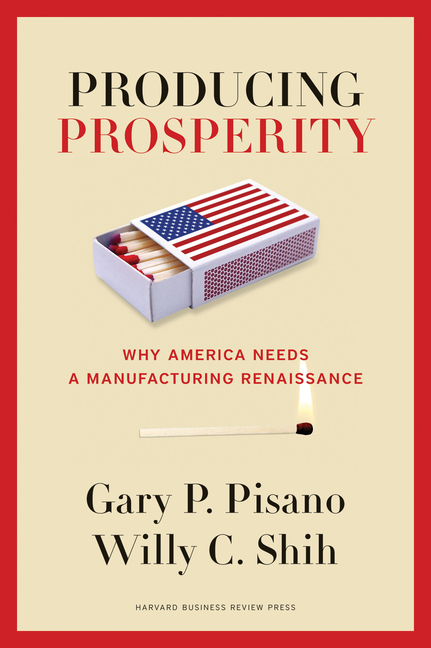Jack Covert Selects - Producing Prosperity
November 09, 2012
Producing Prosperity: Why America Needs a Manufacturing Renaissance by Gary P. Pisano & Willy C. Shih, Harvard Business Review Press, 192 pages, $27.

Producing Prosperity: Why America Needs a Manufacturing Renaissance by Gary P. Pisano & Willy C. Shih, Harvard Business Review Press, 192 pages, $27.00, Hardcover, November 2012, ISBN 9781422162682
Business leaders and economists have argued for almost two decades now that we’re entering a postindustrial society, that we’re really in the business of R&D, software, and services, and that “the decline of manufacturing in the United States is a natural and healthy evolution toward a more knowledge-based economy focused on services and innovation.” Gary P. Pisano & Willy C. Shih, Harvard Business Review Press, 192 pages, $27.00, Hardcover, November 2012, ISBN 9781422162682
Gary Pisano and Willy Shih present a more complex view in their new book, Producing Prosperity: Why America Needs a Manufacturing Renaissance. They believe that we are indeed an innovation and knowledge-based economy, but that manufacturing still plays an essential and integral role in the process. And they believe this is why maintaining an “industrial commons” is so important.
[U]nderlying every industry are sets of technical and operational capabilities, some of which are shared across firms and even across industries. These shared capabilities form what we call the industrial commons. The commons is embedded in suppliers, customers, partners, skilled workers, and local institutions such as universities. Commons are sources of competitiveness for industries that draw from the shared capabilities.
The continued decline of our industrial commons will make it much harder to compete in emerging industries, the authors contend, because the infrastructure and know-how have moved overseas. Although they are writing from an American perspective, they make the case not because it’s good for the country, but because it’s good for business:
Ours is not an appeal to economic patriotism or corporate social responsibility. We argue that companies should be investing in the local industrial commons because it can be a source of competitive advantage.
And, of course, we can all use any advantage we can find—or build.
The authors also challenge our assumptions that the industrial worker is an unskilled laborer, and that the factory is but a belching behemoth of an old economy and outdated mindset rather than the site of great innovative potential. “In most factories we have visited,” they write, “we have seen a lot more brain than brawn at work. Manufacturing has become knowledge work.”
While this book may not appeal to every reader, Producing Prosperity is an essential addition to how we think about manufacturing and its contribution to our modern economy. It’s an argument, really, for not throwing the baby out with the bathwater, and that alone will inspire achievable innovations.

